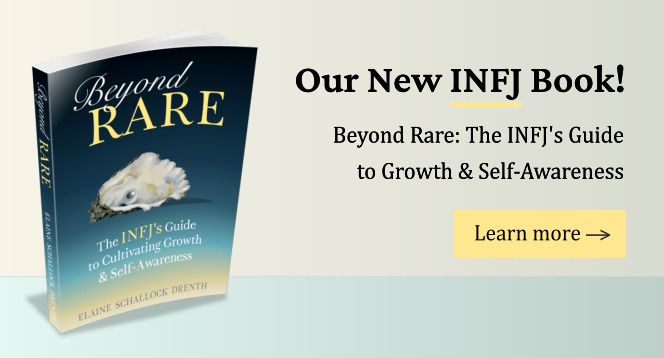
An INFJ sighting in the wild is rare enough; therefore, an INFJ-INFJ pairing would seem tantamount to myth – about as likely as catching a glimpse of a unicorn or a UFO or any other fictional “U”-named objects of folklore. Okay, okay, I exaggerate. Although I personally have never born witness to the fabled INFJ-INFJ pairing, it is, of course, a possibility; this is evidenced by the fact that we have received more than a few inquiries about the prospective compatibility of such a relationship. So here goes.
On a theoretical level it can work. In fact, we propose that any type pairing can work in theory, but different pairings will encounter problems unique to that combination. Some have a higher likelihood of compatibility than others due to shared preferences and/or functions, while others will have more hurdles to clear in order to thrive. The obvious advantage to INFJ-INFJ relationships is they share a great deal of symbiosis and intuitive connectivity with each other since they are the same type. A shared strength of intuition and a love of communicating their theories with others means that the INFJs will greatly enjoy doing what they love to do together with each other. They will likely find that they share a similar value system and an eerie ability to read their partners’ thoughts and feelings, even before they are ever spoken. This makes them particularly well equipped to help meet the needs of their partner, intuitively knowing and understanding what the other is looking for. Because INFJs often feel so misunderstood and alien in the world, partnering with someone who understands them so well (just as they understand others) is likely to be a source of great comfort and friendship.
In addition, INFJs are incredibly good communicators and are very much at home in the realm of relationships. They really invest in their relationships and are constantly communicating with their partners in order to troubleshoot any relational issues that might come up. In that way they have a great advantage over other types when it comes to the likelihood of success; by naturally making the relationship a priority and being willing, excited even, to talk about the health of the relationship, they position themselves ahead of other couples from the starting gate. In other words, the relationship is not likely to suffer from neglect.
That said, I can see how an INFJ-INFJ pairing (like any pairing of the same type) could create a “this relationship isn’t big enough for the two of us” scenario, where there may be an unspoken air of competition between the two. INFJs are incredibly committed to their theories and ideals. If both INFJ partners see things the same way then there is no problem. But if they don’t (especially on an issue of great importance), that can create an exceptional amount of strain. Neither is likely to loosen the grip on his/her theories and ideals, no matter how much he/she values his/her partner. INFJs have a history of projecting lofty ideals onto their partners, whatever the type, ultimately resulting in their being accused of having unattainable or unreasonable standards when those ideals fail to be met. And this behavior has been the culprit behind many a failed INFJ relationship. But this propensity has the power to become particularly exaggerated if the INFJ is dating a fellow INFJ. The unusually high expectations that INFJs are wont to cast on any relationship are kicked up a notch (if that’s even possible) with another INFJ – most likely because INFJs knows what the INFJ is capable of. And they expect a lot.
But here’s the rub. INFJs are masters of the conception/theory portion, but can fall short when it comes to Se (i.e., their inferior function) action. They may fail to consistently enact their own theories or advice. In other words, if one or both of the INFJ partners is looking to the other to complete the Se piece of the equation that they lack, the relationship can (and likely will) fail. This is where learning to let go of S outcomes, along with showing grace is extremely important. Both INFJs must understand that they share the same strengths, but along with that comes the same weaknesses. They cannot expect their partner to pick up where they fail. This may cover everything from finances and budgeting to other pragmatic concerns like remembering to have the car serviced or bills paid on time. If both partners agree not to hold the other responsible or blame the other when one or more of these S/T concerns arises, then there is a higher likelihood of success.
A final word of caution: part and parcel of that concept of competition in the relationship is the potential for one or both partners to question his/her value in the world, particularly if they are constantly around another INFJ. INFJs already intuitively know that, generally speaking, the world undervalues their special brand of know-how. And they often feel undervalued, having to fight hard to get their piece of the proverbial pie and do it authentically. This is hard enough on its own, but can be particularly demoralizing if an INFJ gets the sense that someone out there (in this case, the INFJ partner in the immediate vicinity) is already doing the job. They may feel (even if irrationally) that they are not needed and that finding actualization is almost impossible with another INFJ around. In a worst case scenario, the INFJ may end up losing him or herself entirely in the process of a relationship where it’s not always clear if one is looking in the mirror or at someone else entirely (the INFJ partner). The result of such an experience could be a very deep psycho-spiritual crisis, which is particularly likely if the INFJ has yet to individuate.
As with any relationship, the more personal growth and individuation that a person has done, the more likely it is that his/her partnership will be successful. The maturity and wisdom that comes from self-growth always positions individuals in a better place to relate to their friends and loved ones. Moreover, if both INFJs have found success in other areas, such as their education, career, and outside friendships, feelings of competition will be reduced and the relationship’s chance of success increased.
Learn more about INFJs—their personality, relationships, life struggles, paths to growth, and much more—in our new INFJ book:
Beyond Rare: The INFJ’s Guide to Growth & Self-Awareness

Jay says
Great post Elaine. You touched on some great points. Couldn’t be better timing for me. I’ve been thinking a lot about this coupling, since recently separating from a long term relationship with an esfp. Wondering “what next?” and not being able to imagine myself with many types, especially someone who isn’t even close to individuated. I’m even skeptical of our supposed natural pairing (ENTP). No fun being an infj sometimes is it?
Carrie says
Thanks for this great poat! I’m an INFJ married to an INFJ and you hit exactly in some of the great and not so great things about our dynamic. We were attracted to each other because of that rare “finally someone gets me” and “someone can join me on my theoretically mind journey into my great vision for the world”. But it definitely has its downfalls (we definitely struggle with things like regular bills and who makes sure they are done on time).
Monica says
Hi Elaine–fun to hear another INFJ’s perspective.
I haven’t been in a romantic relationship with an INFJ, but I have noticed the competitive rubbing in friendships. I think this may be due to the fact that our J side is so certain about EVERYTHING–that when those certainties collide, so can the friendship over time, as our introversion and feeling sides just get drained by the conflict and withdraw.
I’m married to an ISTP, and while that combo was challenging in the beginning because he literally couldn’t care less about my theories, having such a stable Se partner has been a lifesaver for me as I face my own challenges in the workplace. I think if I were married to another INFJ, we’d have great conversations, but we’d starve.
Scott E. Stratton says
“I think if I were married to another INFJ, we’d have great conversations, but we’d starve.”
Monica, that sentence made my day. I am still laughing.. I am usually typed as INFJ, but it’s not for sure by any means. Regardless, am sure,that I have often had similar thoughts: I would do almost anything to be close to someone that “got” me; or would at least talk endlessly about abstract stuff as if it were as important as things like eating, paying bills, remembering where you, your keys, and your phone are at the moment. Then I would think, but seriously – if you did, you both might really starve to death or accidentally walk into a bus or something, or freeze to death with thousands in the bank but no heat because we forgot to pay it like ten times that year.
Cheers,
Scott
Ken Kopp says
Hello, I am an INFJ that was married to another INFJ. We met and where instantly inseparable for 27 years. Only her death separated us. It does happen and is beyond description.
Mariel Nicole says
My partner and I are both INFJ’s and our love has always felt cosmic. We were secretly in love with each other for five years and never told each other for fear of rejection, but the timing finally became right for us to be together and now another five years later and I am more in love than ever. I finally have someone who whole-heartily understands my heart and head. The only issue we always run into is that we both always feel that we are right about everything and hate being told to do something a different “more efficient” way, very typical INFJ traits, but we always work through it and never stay mad at each other for more than a few minutes! Luckily, we both have the same exact liberal out-look on politics, religion, and other worldly matters so we never butt-heads about values because they’re the same! We’re also both artists and appreciate alone time to make art so that’s something that has added an extra depth to our relationship. Just thought I’d add my two cents since we’re quite a rare pair!